To gain a well-rounded and accurate perspective on the autism spectrum, and what autism feels like, it’s important to listen to as many autistic voices as possible.
Although there are many shared experiences among the autistic community, autism is also a spectrum condition that can affect each individual in unique ways. As just one example, some autists are hypersensitive to particular sensations while others are hyposensitive and sensory-seeking. Moreover, support needs can differ depending on the individual and their current situation.
Nowadays – thanks to the internet and the efforts of advocates – parents of autistic children can learn straight from the lived experience experts themselves about the internal and external autism experience. Even better is that many of these autists also have autistic kids, as the condition is highly genetic.
While, in the past, autism research tended to focus on children, it was mostly conducted by allistic (non-autistic) researchers. Despite their (usually?) good intentions, those without lived experience of a condition have a limited view of what it’s like to live day in and day out with a particular condition. Hopefully, in the future, we’ll see more of this research from autistics!
This article provides insights from an array of individuals on what it feels like to be autistic. The quotes are taken from Instagram, and you can find more content by following the links beneath the quotes.
How It Feels to Be Autistic in Loud or Busy Environments

Autistics are more vulnerable to anxiety than the general population. Many have light, sound, or smell sensitivities, among others, that can get triggered when they’ve spent too much time in a situation with too much going on. In complex, busy, or loud locations, autistic people may struggle with sensory overwhelm or overstimulation, problems filtering out and prioritizing sensory input, and challenges keeping up with conversations. The unpredictability and inaccessibility of these environments might stress them out, too.
All of these factors can raise their anxiety levels, even leading to a meltdown, shutdown, or a sensory hangover. However, it’s also important to remember that each autist has their own sensory profile, and this can change over the years. (And sensory under-responsivity is a neglected area of research.) Tools such as noise-canceling headphones and earplugs can help make loud environments more manageable.
Here are some quotes about what it can feel like being autistic in noisy or overwhelming environments:
“For many autistic people with sensory sensitivity, even the smallest sound can be incredibly painful. Even more, if these sounds are layered, one can hear everything in its pure, overwhelming complexity.”
LiL Penguin Studios, Instagram: @autism_happy_place
“How I wish I recognized sensory overload: Wow all this sensory input is really affecting me! How I actually recognize sensory overload: I’m angry and don’t know why! Oh wait. I’m tired and don’t know why! Oh wait. I’m weepy and don’t know why! Oh wait.”
OMG I’m Autistic AF, Instagram: @omgimautisticaf
“What Autistic Overwhelm (“Meltdown”) might feel like… Might creep up slowly or happen quickly. It may feel like your brain starts to lose its grip on logic. It can feel like storm clouds rolling in. Can feel like an influx of negative thoughts with no access to anything positive. It may feel like extreme overwhelm. May feel unable to speak. Everything might feel too loud, too bright, “too much.” Your brain may have a flood of tense thoughts & emotions. You may feel like escaping your skin or running away.”
Adrienne Marcellus, Instagram: @allforthedopamine
What Autism Feels Like in Social Situations

It’s quite common for autistic individuals to struggle in social situations. This can be due to the differing communication styles of autistics and allistics (and the double empathy problem). For example, autistic experiences may involve slower processing speed and exhaustion from masking and monitoring oneself (especially in groups). Likewise, not all autists are able to mask.
Other difficulties can be knowing when and how to enter a conversation, dealing with small talk and banter, and interpreting body language and facial expressions. The term “social hangover” describes just how draining social events can be.
Understandably, social anxiety frequently co-occurs with autism. However, sometimes autists aren’t diagnosed with “social anxiety disorder” (or “generalized anxiety disorder”) as these challenges can be better explained by being autistic in a neurotypical world.
Read on to discover what autism feels like in social situations:
“Being autistic, for me, has often felt like everyone else was born with an innate understanding of how to act and be, including in social situations, like they had a book which told them what to do. I have always felt that I never had this book of social understanding.”
Lou, Instagram: @neurodivergent_lou
“If your social anxiety manifests as worrying about controlling your eye contact, facial expressions, tone of voice, other body language, and responses to people in order to appear “normal”, then it may be rooted in autism.”
Ellin Park, Instagram: @autistic.qualia
“Masking has been such a wonderful survival skill in my life but it’s a really really tiring experience which often leads to mental and physical exhaustion. Lately, I’ve been really worn out from masking. It feels like such a strain to carry myself through many social interactions and the manual nature of it all.”
LIS, Instagram: @junkyardfrog
“He was being bombarded on all sides by different people, different hands, different voices. And these people were controlling his body, putting slimy newspapers near his face, and making him touch a paper mâché mixture (which he clearly voiced that he didn’t like) … That was too much, so he started screaming and then pushed off one of his caregivers.”
The Autisticats, Instagram: @the.autisticats
What Autism Feels Like in School

A survey mentioned in Is This Autism: A Guide for Clinicians and Everyone Else found that around 43% of autistic children had experienced school avoidance, compared to 7% of non-autistic students. Numerous autists have commented on how traumatic school was for them, particularly high school when social dynamics and academic demands become more complicated. Unfortunately, autistics can often be victims of bullying.
Considering that the majority of autistics love learning (e.g., special interests), it seems most education systems set them up to fail.
One reason it’s vital to spread positive autism awareness and acceptance is so younger generations of autistics can avoid the stigma, ignorance, and judgment (including from teachers and health workers) that many older autistics have faced.
Autistic children become autistic adults. I’m sure that most late-diagnosed and late-identified autists would have appreciated knowing the truth and being supported in neurodiversity-friendly environments at a younger age!
Here are some insights from autistics about what autism felt like in school:
“The thoughts of an autistic child (whilst at school). Why is no one like me? This is too much. I’m uncomfortable. I really want to go home. Am I being bullied or is this normal? I just want to fit in. HAHAHA (I don’t get it). It’s too noisy. I don’t remember what the teacher just told us to do … I’m scared. There’s definitely something different about me.”
NADIA, Instagram: @autisticblackgirl
“Is it “school refusal” … Or is it an act of self-care and self-advocacy for an overwhelmed, burnt out, and traumatised child?”
GEM, Instagram: @neurodivergent_researcher
“As a child with autism, there were frequent contradictions about me. Early development here, late there. Brilliant at maths but couldn’t read. Hated loud sounds but loved music. Mature but delayed. Well behaved but disobedient. Calm but dysregulated. Good at this, bad at that … My strengths were used as evidence that I was lazy and couldn’t be bothered to do the things I struggled with. After all, how can someone be so good at something and so bad at others?”
juno, Instagram: @flappyfroggie
What Autism Feels Like at Work

Traditional workplaces can be major sources of stress for anyone, but autistic and other neurodivergent people might face additional challenges. Many of these are structural and attitudinal barriers that, with the right understanding and support, could be ameliorated.
Along with the often complex social expectations, other struggles may involve sensory over- or under-stimulation, communicative differences, unaccommodating environments and attitudes, stigma and discrimination, and a lack of flexibility. Here is a recent interview of mine on neurodiversity in the workplace.
Below are quotes on what autism can feel like at work:
“Accessibility shouldn’t be an afterthought, but integral to designing and implementing workplace processes. When we say something is hard for us, we should be believed. And when we say something works for us, we should be supported.”
Reframing Autism, Instagram: @reframing_autism
“I can’t do my job without eye glasses. No, you need to try harder. Apply yourself. Squint more. I know…We’ll give you a brighter lamp instead–that works for another employee. It’s all about your attitude–believe in yourself! You can overcome your eyesight!”
Autistic Studies, Instagram: @autistic_studies
“They let me walk around the office, listen to music, play with stim toys, and look at my phone while working. They also explained to my colleagues that I’m not slacking off when I do these things and that they actually help me to focus better. During video calls, they’re cool with me typing out what I want to say instead of speaking.”
Rachel, Autistic as Fxxk, Instagram: @autisticasfxxk
“Applying to jobs has revealed to me how ableist hiring practices are. You can never even reveal you have a neurodivergence or mental health issue, not even when you’re hired! During an interview I was asked: How do you effectively deal with distractions? Ha! I don’t! ADHD!”
Much Much Spectrum, @muchmuchspectrum (via X: @emoatypwarrior)
What Autism Feels Like for Autistics with Medium and High Support Needs

When you are officially diagnosed with autism spectrum disorder, the clinician will likely give you an ASD level out of level 1 (requires support), level 2 (requires substantial support), or level 3 (requires very substantial support). Self-diagnosed and formally diagnosed autistics frequently use the terms low, medium/moderate, and high support needs – or the abbreviations LSN, MSN, and HSN – to refer to their support requirements.
From what I’ve observed, the online autism community tends to be dominated by those with lower support needs, so it’s highly recommended to amplify those with moderate and higher support needs (e.g., non-speaking autists), too.
Here are insights from autists with higher support needs:
“Unfortunately, the reality in this society is that disabled people are often the targets of bullying, judgement, harassment, and ableism. This tends to happen even more frequently and harshly if you have a “visible” disability. Growing up with more noticeable and outward autistic traits and requiring more significant support needs – I experienced bullying regularly.”
Getaway Autist Mobile, Instagram: @getaway_autist_mobile
“We nonspeakers are so strong and so resilient, and we keep trying and hoping and living through the immense challenges we face. Each thing we struggle with is not a weakness only, but also a profound strength. And much of that struggle, we cope with internally on our own.”
Danny Whitty, Instagram: @dannywithwords
“Most of the people shaming the support needs labels vocabulary do so because they haven’t faced the kind of discrimination that MSN and HSN autistics do; they feel as if acknowledging other forms of discrimination invalidates their experiences. Most of them are low support needs. Nobody is saying that LSN autistic people are “less autistic” or less worthy of support.”
The Angry Autist, Instagram: @angry_autist
I hope you’ve found these insights to be illuminating, and that you’ll continue engaging with autistic people and their content.
What is being autistic like for you?
Share your experiences with our welcoming neurodiversity community below.
Monique Moate is a late-diagnosed autistic woman whose interest in autism spectrum disorder and disability stems from a lived-experience viewpoint. She enjoys the written word and thinking about how people use language.

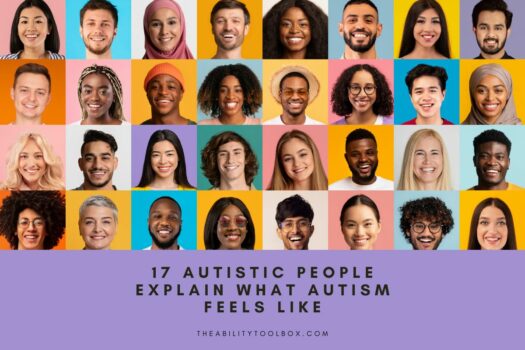



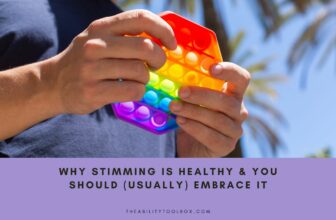
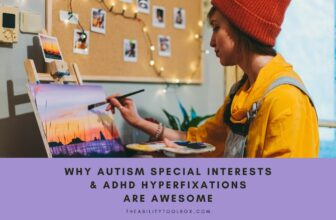
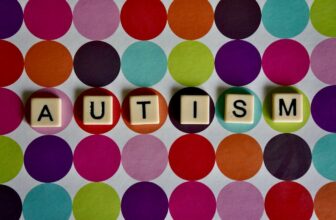
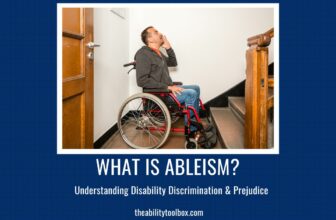
Start the discussion at community.theabilitytoolbox.com